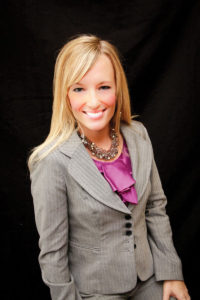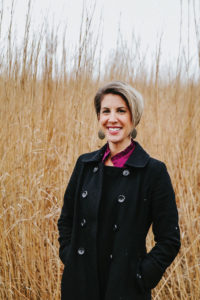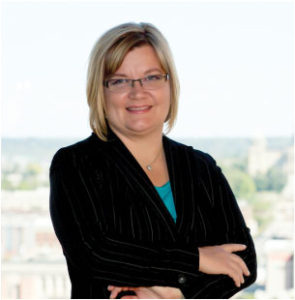Root cause
10/2/2019Learn why some central Iowans are turning to holistic, functional medicine to cure body, mind.
 Brittany Cousins was frustrated with the moodiness and lethargy she felt from the thyroid condition with which she’d been diagnosed.
Brittany Cousins was frustrated with the moodiness and lethargy she felt from the thyroid condition with which she’d been diagnosed.
About three years ago, her doctor diagnosed her with hypothyroidism, a condition in which the thyroid becomes underactive and does not produce enough thyroid hormone. She was prescribed medicine to regulate her condition and spent the next two years working with her doctor to resolve the symptoms she continued to experience.
“It’s supposed to fix it,” Cousins, who lives in DeSoto, says of the medicine she was prescribed.
Her doctor tried natural remedies as well that seemed to help a bit but overall didn’t leave her feeling any better. Cousins started to conduct research on her own about thyroid conditions. She found a local clinic that treated thyroid conditions by getting to the root cause and read testimonials from other patients.
“It really drew me in because it was the first time in my life I’d had a major health issue,” Cousins, now 30, says.
She went for a consultation and blood draw at Yost Wellness Center in Urbandale. After Dr. Heather Yost reviewed the test results with Cousins, it revealed deeper issues that Cousins says a regular doctor would not have discovered until she started showing symptoms, which could have been years later.

Brittany Cousins holds up an old outfit to show the 40 pounds she lost after she sought treatment from a functional medicine doctor for symptoms she was experiencing from a thyroid condition and the medicine she had been prescribed. Photo submitted.
Cousins had high levels of inflammation in her body and was prediabetic. She was deficient in several vitamins, some of which her regular doctor had told her to take. For some reason, her body wasn’t absorbing them, which was an indicator she had leaky gut, a condition in which the digestive system develops gaps between the cells of the membrane lining and substances within the digestive track can “leak” from the intestines and into the bloodstream.
“Long story short, there were a lot of other things going on with me other than my thyroid condition,” Cousins says.
Her mom was with her when she received the news from Yost. Her mother herself has a lot of health problems and has decided to undergo testing and make changes.
“It was very emotional,” Cousins says of getting the results. “It was like: ‘You will end up like your mom if you don’t fix this.’ I’d never had anybody say that to me.”
Yost gave her a choice: Continue down the path she was on — one that included the normal Iowa diet of meat, potatoes, corn, fast food and carbohydrates — or take steps to heal her body from the inside out and not just put a bandage on the problems.
She chose the latter. Yost created a custom program for her in which Cousins underwent a 30-day detox and was limited to fruits, vegetables and proteins. Then she underwent a food sensitivity test to learn which foods were high, medium and low sensitivity risks for her having an inflammatory reaction in her body.
Functional medicine part of holistic health movement

Dr. Heather Yost is a chiropractor who operates Yost Wellness Center in Urbandale. She uses functional medicine to determine the root cause of health issues patients experience and to help them discover potential future health concerns they may have before symptoms appear. Photo submitted
Functional medicine is a form of alternative medicine. Holistic health is a broader term that focuses on interactions between the environment and the gastrointestinal, endocrine and immune systems. It examines the person’s lifestyle and biochemistry, considers his or her genetic predispositions and looks at surrounding environmental factors and toxicities.
The approach of holistic health is to look at the entire person — body, mind and spirit — to integrate conventional and alternative therapies to prevent and treat disease and to promote optimal health, according to the American Holistic Health Association, an independent national nonprofit educational association that assists individuals in locating resources for wellbeing and health. The belief is that the whole person is made up of interdependent parts, and if one is not working properly, all the other parts are affected.
Treatments include diet, exercise, psychotherapy, relationship and spiritual counseling, acupuncture, chiropractic care, homeopathy, massage therapy and naturopathy.
Holistic medicine analyzes the physical, nutritional, environmental, emotional, spiritual and lifestyle elements that affect an individual’s health. It focuses on searching for the underlying cause of a condition or disease rather than treating the symptoms alone.
“The biggest question we ask is ‘Why? Where’s it coming from?’ We don’t guess. We test,” says Yost, who is a chiropractor and opened Yost Wellness Center in 2004. “Symptoms are a warning sign of the body saying something is wrong.”
Functional medicine should be viewed as preventative care just as an annual appointment to a regular doctor, Yost says.
The body always processes illness before a person experiences symptoms, she says, adding that the average autoimmune disorder takes 13 years before being diagnosed.
“The idea that we should wait to take care of the body when it breaks down is a limited approach,” Yost says.
Dr. Jennifer Welch agrees. Only about 10 percent of the people she sees visit her before they have symptoms. For most, it’s because they saw a family member struggle with a health condition, and they don’t want the same for themselves.
The leading cause of death in the United States in 2017, the most recent year for which the Centers for Disease Control and Prevention has statistics available, is heart disease. Some functional health doctors say cardiac issues can arise from inflammation within the body and the health of a person’s gut or the bacteria within it. A functional medicine doctor may detect these issues before cardiac symptoms occur. Conventional tests check basics such as cholesterol levels from a blood draw. Further testing might include a resting electrocardiogram or stress test, but such tests may not uncover early signs of cardiac disease.
Welch oversees Iowa Functional Health and has worked in functional medicine for more than a decade and says anyone who suffers from a chronic condition is a good candidate for functional medicine. This includes those with thyroid conditions, diabetes, autism, attention disorders, chronic fatigue, depression and digestive issues.
A lab conducts a panel of tests that is much more extensive than those done at a conventional medical office. This includes testing for the presence or lack of certain markers that indicate prediabetes, inflammation markers, Vitamin D, magnesium, hair testing for the presence of heavy metals or mineral imbalances, stool analysis for bacteria or infections in the gut, and urine testing for metabolites to determine how the body uses nutrition.
The purpose is to unveil the root cause of the person’s symptoms or to provide early detection of a toxin, nutritional deficiency, infection or another issue that has caused the immune system to react.
Best care scenario: when all doctors work together
There are times when she can’t help a person, and Yost says she’s honest with people when that happens. There also are scenarios and injuries in which one needs a medical doctor such as a stroke, heart attack or broken bone.
That’s why Yost says she’s involved in an effort in the greater Des Moines area to create a network of interconnected doctors to ask better questions in order to get their patients the appropriate type of care. She’s worked with other conventional medicine doctors — both as a patient and their provider — for more than 15 years.
“We’ve got to stop asking the right questions to the wrong doctors,” Yost says. “We have to be our own best advocate.”
There is a shift that has occurred that’s driven by the consumer. Some patients are tired of taking medications and not feeling better or not receiving an answer for their problems.
Welch, who practiced functional medicine in Kansas before opening her clinic in Clive in 2014, says 90 percent of her patients come to her because they’re frustrated by the traditional medical community.
“They have a chronic condition, and they’re either given more medication or there’s side effects from it,” she says. “There’s not more help being given to them to reverse it.”
As a result, medical doctors from oncologists to cardiologists are referring patients to functional medicine providers for an interdisciplinary approach.
Mayo Clinic’s Integrative Medicine and Health department offers services for a patient’s physical, emotional, spiritual and mental health and wellbeing. Services not traditionally part of conventional medicine, including herbs, acupuncture, massage, yoga and meditation, are used, according to Mayo’s website.
Cleveland Clinic, another renowned medical facility, has its Center for Functional Medicine, which is a collaboration between the clinic and the Institute for Functional Medicine. Physicians spend time with patients, listen to their history, map a personal timeline, and examine genetic, environmental and lifestyle factors that influence long-term health and chronic disease.
The department’s website admits that too often patients have blood tests, X-rays and other diagnostic tests performed and are then told from their doctor their tests are normal, but yet they and their doctor know they are unwell.
“Unfortunately, this experience is all too common,” according to department’s website. “Our physicians … aim to reduce this problem by applying a new model that focuses on treating your body as a whole system, that treats the causes not only the symptoms, that sees the body as a whole organism, rather than simply a collection of organs.”
Lifestyle causes improved changes
Now, a year later, Cousins has slowly re-introduced some foods to her diet, but stays away from those that caused inflammation.
“It’s literally just eating cleaner,” she says.
Not only has she lost 40 pounds, but her life has dramatically changed in all areas. Her anxiety is gone. She sleeps better. Her hair and skin look healthier. She feels better overall.
“This is the real deal,” Cousins says.
She’s still taking her thyroid medication but no longer experiences exhaustion. She has energy all day and when she gets home from work. Exercise is easier for her. Her lab results from her most recent blood draw show dramatic improvement. She says she scored an A++ in every category compared to her first test results.
“My body literally healed itself,” Cousins says.
When a person such as Cousins visits a functional medicine doctor such as Yost, they go through an initial consultation. The doctor talks through the person’s story: Where have they been? What have they been experiencing? What do they want help with?
An initial blood draw and lab work is completed. The results are analyzed and a game plan is created. This may mean the patient needs to change his or her diet. They might be vitamin or nutrient deficient. They may need to start exercising. They may need to start managing their mind through meditation, writing in a journal, observing and redirecting their thoughts.
“Managing stress doesn’t mean you change what happens around you,” Yost says. “It means you change your mindset around it.”
Family uses holistic methods

Shannon Myers is a certified rehabilitation counselor who works as an integrative health practitioner with her business The Paleo Counselor. She says the mental health component of functional medicine is often missing, so she coaches clients to address mental trauma and past history on their road to wellness. Photo submitted
Emily Lewis of St. Charles wasn’t into any of what she called “witchy-woo” holistic care until she was pregnant with her first son about five years ago. She started to research information about childbirth and decided she wanted a midwife and a doula to assist with her labor and delivery. She was fearful of having a cesarean section, didn’t want an IV or an epidural, and thought a midwife would better honor those wishes.
Lewis also was considering the best wellness plan for her unborn child.
“I was hesitant about vaccines but didn’t feel educated enough to not vaccinate, which is totally backward to me now,” Lewis says.
Jed Lewis was born a healthy baby boy via natural childbirth. He thrived. He giggled and smiled. By the time he was 6 months old, he was babbling and trying to speak.
All of that changed within a week of his six month appointment.
He just stopped chatting and got really quiet,” Lewis recalls. “He stopped looking at us when we said his name. He started tapping on a lot of stuff, his body and objects, and got extremely fussy. It kept getting worse from there.”
Lewis shared what she and her husband noticed with her pediatrician, who told her that boys often regress. Jed never started to talk. He was a late walker. The Lewises thought he might be deaf because they would yell his name and receive no response from him. They wondered if he was autistic.
They switched to a new pediatrician and showed her videos of Jed prior to his six-month appointment and afterward. She examined his records, including his vaccination records.
“She’s pretty confident this was a vaccine injury,” Emily Lewis says.
It was determined Jed does not have autism, but he does have a language disorder. His disability is cognitive and affects his brain and his ability to think.
“We don’t know if he will ever talk,” his mother says of Jed, now 4.
Earlier this year, Emily was browsing a natural medicine page. She’d posted about her son and his disability. Someone commented and inquired as to whether she’d considered giving Jed hemp oil.
“If you asked me a year ago if I’d give it to my kid, I’d say ‘No,’ ” she says. “I had heard of people taking it but thought they got high from it.”
Emily researched further into the use of hemp oil, read testimonials and talked to other mothers who used it about their results. She and David decided to try it for Jed in addition to the vitamins he was already taking to help better absorb nutrients.
Within the first week, the Lewises thought they noticed changes within their son. They weren’t sure whether they were really there or if it was wishful thinking, so they decided not to say anything to Jed’s therapists.
A few weeks later, both therapists came in to visit Jed.
“They said ‘I don’t know what’s going on, but he’s had a huge jump in progress,’ ” Emily recalls.
Jed’s demeanor was calmer. He wasn’t speaking properly, but he was trying to say more, and what he was trying to say came out more clearly.
“He’s definitely progressed quite a bit since he started taking them,” Emily says.
Hemp oil — not to be confused with cannabidiol or CBD oil, which is produced from a different part of the hemp plant and can contain higher concentrations of CBD — can be full-spectrum oil from the Cannabis sativa plant or from hemp seed oil that comes from the seeds of the plant.
The oil has nutrients, fatty acids and bioactive compounds that may help with health issues such as inflammation, skin conditions, high blood pressure, cholesterol, plaque in the arteries, pain, muscle tension and acne. It has also been shown to improve brain health by removing inflammation, according to a 2018 study published by the U.S. National Library of Medicine-National Institutes of Health.
Emily takes the oil to alleviate stress, which she says has helped her stop taking anti-anxiety medications. It also helps her sleep better. Both she and David use it to alleviate pain. She also occasionally gives it to her son Clay, 2. The family no longer uses over-the-counter pain relief medications.
The Lewises also all regularly get adjustments from their chiropractor, which Emily says alleviates a lot of their problems.
“It makes me feel better,” she says, adding that she no longer gets migraines. After an adjustment, both of her children have more regular bowel movements and sleep better at night. Neither one gets ear infections, which plagued Jed when he was younger.
Overall, the Lewises have cut out sugar from their diets other than that they receive naturally from fruit. They no longer use synthetic fragrances. They eat organic foods. Emily has removed toxic ingredients from everyday products they use in their home, all in an attempt to get more to the root cause of any health issues they experience.
“It’s all tied together,” Emily says. “We don’t just treat the symptoms. We try to get to the root cause of it.”
Counselor says mental health link is often missing
While functional medicine gets to the root cause within a person’s physical body of what is causing their problems, it misses the mental health aspect, says Shannon Myers, a certified rehabilitation counselor who works as an integrative health practitioner with her business The Paleo Counselor.
Myers works with alternative and holistic medicine modalities and bridges it with conventional medicine. Many of her clients have seen success and levels of healing, both from conventional medicine as well as holistic, but they still have a trauma or a mindset where they’re focused on the diagnosis. Myers coaches them on how to let go of the diagnosis or the past trauma that is rooted in their brain, so they may fully heal.
“Someone will come to me who’s always been holistic and ended up at functional medicine, but they might still feel anxiety and they’re not all of the way” healed, she says. “Or someone who has tried everything within the medical model, but they’re done with it.”
Myers herself had to overcome her own mental trauma in order to heal from what she says were 14 different conditions, including cervical cancer, an autoimmune condition, a mold illness and several mental health issues.
“I thought this is it,” she recalls. “I was single, had lost my job, lost my insurance and was diagnosed with cancer. I was like ‘I don’t know what I’m going to do.’ ”
Myers grew up in poverty and was a first-generation college student. Her years of hard work to get to college and become a college graduate had put a bigger strain on her body and mind than she realized.
She had sold medical devices and been in pharmaceutical sales. She had a gut-check moment in which she realized she needed to bring self-healing to herself. No one else was going to save her.
“It was that life or death scenario: Are you going to sit there and say ‘This is it’ or do something about it?” Myers recalls.
She researched her own health conditions and started self-experimenting, she realized there was a strong connection to the mind’s ability to heal the body. She started to eat healthier. She changed careers. She left a
relationship. She overhauled her life. She stopped going through the drive thru, ordering fast food and drinking
soda. She started to meditate. She started to practice yoga and move her body.
The inflammation within her body decreased.
She realized she was not her thoughts and came to understand where those thoughts came from and how to observe them without becoming them, to remind herself that she was in control of many areas of her life.
As a result, she says she was able to resolve her cancer. Years later, Myers got married and had a child. After the pregnancy, she ended up with an autoimmune condition and post-partum obsessive compulsive disorder. She turned to functional medicine and discovered her mold illness and celiac sensitivity.
“We can heal when we get to the root,” Myers says.
Many times, the root issue has to do with the individual’s environment, trauma he or she experienced, a low-grade infection or dissatisfaction with a job or relationship, for example. That root cause is within the mind, she says.
“Our body rises up to meet our thoughts,” Myers says.
Myers coaches each of her clients in breathwork and meditation. She guides them to get underneath, to observe their thoughts and explore their past traumas. She gives them tools to understand what and how to eat. She assigns them books to read and suggests alternative behaviors. If the person has a spiritual belief system, that’s incorporated, as is the person’s functional and conventional medicine doctors and any other medical caregivers they have.
She works with both those who take prescription medications for conditions and want to, as well as those who want to avoid medication such as the family who she worked with last year who had a child who had been diagnosed with attention deficit hyperactivity disorder. She met with the family, looked at their cabinets, cleaned them out, helped them find paleo diet recipes and educated them on the food contributors to ADHD. The daughter was able to heal over the course of the next year and now knows what she needs to do for herself.
Insurance companies won’t cover functional medicine

Dr. Jennifer Welch has practiced functional medicine for more than a decade both in Kansas and now Iowa.
Functional medicine doctors say it’s not a matter of they won’t take insurance, but insurance companies most times won’t pay for their treatments. Most recommend a patient check with their insurance company before their first visit to see what will and will not be covered by the company.
Cousins paid out of pocket for her treatment plan at Yost Wellness Center. She says she thinks the lack of insurance assistance prevents many people from seeking the help of functional medicine. Going through the plan has made Cousins reexamine her priorities in life: She chooses to spend money on healthy, organic foods instead of getting her nails done.
“It didn’t just give me tools to eat better, but it changed my perspective on life,” she says.
The Lewis family pays out of pocket for most of their holistic treatments and for their appointments to the chiropractor even though David has insurance through his job and they have a secondary insurance plan.
“It’s kind of infuriating,” Emily says. “This stuff helps quite a bit, and a lot of people use it, but insurance, they just want their money. They’re not going to get it if people are using natural remedies.”
As a small business, Yost says the hardest thing she and her employees do is to try to work with insurance providers. Medical insurance pays for a medical diagnosis that is treated with drugs or surgery, she says, and patients often don’t understand why functional medicine isn’t included.
“We’re trained that our insurance company should pay for our health care,” Yost says.
Health-savings accounts and flex spending accounts do allow the money to be spent toward holistic treatments. Many functional medicine offices will offer patients receipts if they want to try to submit lab work to their insurance company for reimbursement. ♦





















